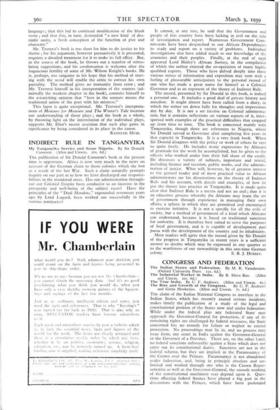INDIRECT RULE IN TANGANYIKA
My Tanganyika Service and Some Nigeria. By Sir Donald Cameron. (Allen and Unwin. los. 6d.)
THE publication of Sir Donald Cameron's book at the present time is opportune. Africa is now very much in the news on account of the German claim to those colonies which she lost as a result of the last War. Such a claim naturally prompts inquiry on our part as to how we have discharged our responsi- bilities in the mandated areas. Has our administration through- out our Colonial Empire been conducive to an increase in the prosperity and well-being of the subject races? Have the principles of the " Dual Mandate," expounded seventeen years ago by Lord Lugard, been worked out successfully in the various territories?
It cannot, at any rate, be said that the Government and people of this country have been lacking in zeal on the side of investigation and report. Numerous Government Com- missions have been despatched to our African Dependencies to study and report on a variety of problems. Individual investigations also have added much to our knowledge of the countries and their peoples. Finally, at the end of 1938 appeared Lord Hailey's African Survey, in the compilation of which the author enjoyed the co-operation of many highly qualified experts. Those who have delved deeply into these various mines of information and exposition may turn with a feeling of pleasurable anticipation to the personal record of one who has made a great name for himself as a Colonial Governor and as an exponent of the theory of Indirect Rule.
The record, presented by Sir Donald in this book, is indeed a personal one. It includes a good deal of private history and anecdote. It might almost have been culled from a diary, in which the writer set down fully his thoughts and impressions day by day. It is not a set treatise on Colonial administra- tion, but it contains reflections on various aspects of it, inter- spersed with examples of the practical difficulties that cropped up from time to time. The book is concerned mainly with Tanganyika, though there are references to Nigeria, where Sir Donald served as Governor after completing five years in that capacity in Tanganyika. It is a very frank book. When Sir Donald disagrees with the policy or work of others he says so quite freely. He includes many expressions by Africans of gratitude for the work he accomplished, but he gives to the officers who worked under him their full share of the credit. He discusses a variety of subjects, important and trivial, including finance and taxation, public works, and the adminis- tration of justice. What will, however, be of greatest interest to the general reader and of most practical value to African administrators are his dissertations on the theory of Indirect Rule and his account, with details and examples, of how he put the theory into practice in Tanganyika. It is made quite clear that Indirect Rule is a means and not an end ; that it is an educative process whereby the Africans may learn the art of government through experience in managing their own affairs, a sphere in which they are permitted and encouraged to exercise initiative. It is not a specific for all the evils Of society, but a method of government of a kind which Africans can understand, because it is based on traditional sanctions for authority. It is therefore best suited to serve the purposes of local government, and it is capable of development pari passu with the development of the country and its inhabitants.
Most readers will agree that the record given by Sir Donald of the progress in Tanganyika in recent years is a sufficient answer to doubts which may be expressed in any quarter as to the worthiness of our stewardship in this one-time German


























































 Previous page
Previous page